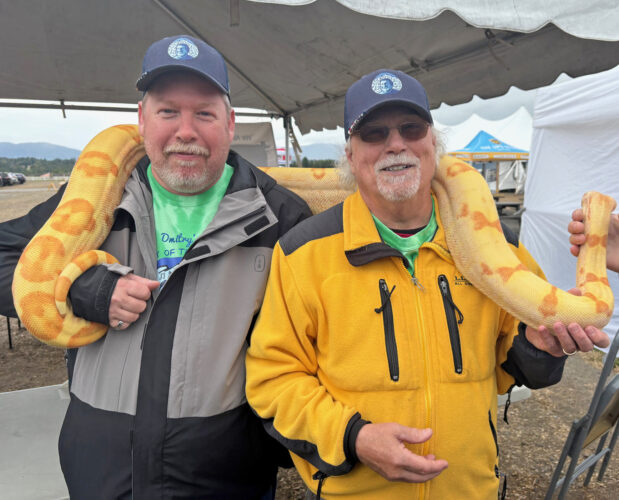MARTHA SEZ: ‘People’s commitment to their tribe can be strong, even fanatical’
Talk about close!
My parents, politically active Democrats, used to tell the story of the 1948 presidential election, how disappointed they were the morning of Nov. 3 by the Chicago Daily Tribune’s headline “Dewey Defeats Truman!”
In a major upset, Harry S. Truman, who had ascended to the presidency after Franklin D. Roosevelt died in office in 1945, beat Thomas E. Dewey, and Democrats took both houses of congress.
In S. Eugene Smith’s famous photograph, Truman beams triumphantly as he holds up the Tribune’s front page, with its erroneous banner headline, for the camera.
“That ain’t the way I heard it!” he is quoted as saying.
It goes to show you never can tell.
A lot of people in this country and around the world are on edge right now because of the unpredictability of the upcoming presidential election. Some people I know speak and post about it fervently and continuously and some say, “Don’t talk about it! I don’t want to hear that name,” while others seem baffled by the conflicting viewpoints of their friends and families.
How can some people cling to their beliefs in the face of evidence proving them to be false? Anthropologists theorize that we humans are innately tribal, and that our social organizations reflect this.
Because humans are, of necessity, social animals, they hypothesize, we have adapted to living in tribes. People’s commitment to their tribe can be strong, even fanatical.
We’re good at telling whose tribe someone is in; we pick up on clues, or shibboleths.
The word shibboleth comes from a story in the Bible, the Book of Judges, Chapter 12, verses 1-15. Originally it referred to the pronunciation of a word. The Gileadites erected a blockade and asked those who wanted to pass to pronounce the word “Shibboleth.” Their enemies, the Ephraimites, another Semitic tribe, had no “sh” sound in their language; they pronounced the word with an “s.” In this way, they were identified as Ephraimites and slaughtered.
A shibboleth has come to mean almost anything — a principle, idea, article of clothing or style, as well as a way of speaking — that distinguishes a person as either part of our group or an outsider. When I was growing up, for example, I was taught to say “curtains” instead of “drapes.” Why? Because the word “drapes” is tacky. That was only one of myriad ways to tell if someone was what the Southern side of my family called a “tack.”
Tacks were known by their dress and their manners as well as their speech. My great aunt Kate, a newspaper woman and perhaps rather reluctantly a “genteel” lady, was heard to say that she liked tacks. According to Katie, “Tacks are more fun.”
Although television has standardized American speech to some extent, there are still giveaways that tell us where someone comes from. Some are more obvious than others.
The other day I heard what sounded like a wolf howl, long and piercing, followed by yipping and barking. It sounded like a team of huskies were sounding off next door.
When I went out into the backyard to find out, I heard it again and realized that the animals making the racket were farther away than I’d thought, probably across the AuSable River, their howls and yips reverberating off Spread Eagle Mountain. Coyotes! I used to hear coyotes often, but not for the last few years, until now.
I noticed when I told people about it that I was the only one who pronounced the word “ky-oat.” Everyone else said “ky-oat-ee,” which makes more sense, since the word is Spanish. I naturally would say “Wile E. Ky-oat-ee,” or “Koy-oat-ay’s always out there and Koy-oat-ay’s always hungry,” but in general parlance I say “ky-oat.” Why the difference?
After a little research (I Googled it) I learned that mostly people from the middle of the country, from north to south, pronounce “coyote” the way I do. So there’s a shibboleth.
Political party allegiance can be tribal. My father used to have me deliver political leaflets door to door while he slowly cruised along the street in the so-called Powerful Pontiac. Republicans wore “I LIKE IKE” buttons. I would have worn an “I DISLIKE IKE” button, but nobody thought to make any. Now that I know more about Dwight D. Eisenhower, though, I think very highly of him. Tribalism isn’t everything.
Some people are saying that all politicians are the same, just grubbing after money and power, but I don’t believe it.
Have a good week.
(Martha Allen, of Keene Valley, has been writing for the News since 1996.)


